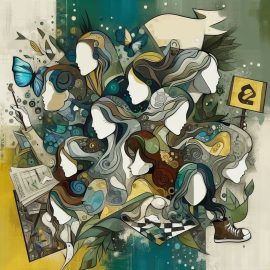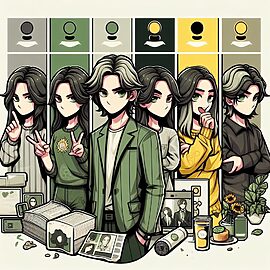RIASEC Personality Types
According to John Holland’s theory, most people are one of six RIASEC Personality Types: Realistic, Investigative, Artistic, Social, Enterprising, and Conventional. Each type has their own values, motivations, and preferred career fields.

Realistic type (Things)
Realistic people prefer manual labour and enjoy operating devices or vehicles. Many realistic professions involve outdoor work, work with animals and require one to get their hands dirty. A realistic profession is the opposite of an office job where you sit inside all day. Common hobbies of realistic people are gardening, having pets, tinkering with cars or other vehicles and outdoor sports such as mountain biking and running. Sectors that include many realistic professions include agriculture, construction, manufacturing, distribution and transport and shipping and aviation.
How do I know if I belong to the Realistic type?
If you belong to the Realistic type, you will probably like being outdoors, playing sports, and working with plants or animals. You probably enjoy building and crafting things and working with tools. Most representatives of this type do not enjoy working with people as much as they like working with things. They are practical and no-nonsense and like to get the job done with a minimum of fuss.
Keywords: physical, outdoors, hands, on the road, machines and equipment, animals.
Basic Vocational Characteristics of a person with Realistic interests:
- Likes to work with animals, tools, or machines; generally avoids social activities like teaching, healing, and informing others;
- Has good skills in working with tools, mechanical or electrical drawings, machines, or plants and animals;
- Values practical things you can see, touch, and use like plants and animals, tools, equipment, or machines;
- Sees self as practical, mechanical, and realistic.
Career Clusters that may be a good fit for people with Realistic interests:
- Agriculture, food, and natural resources
- Architecture and construction
- Arts, A/V technology, and communications
- Health science
- Hospitality and tourism
- Information technology
- Law, public safety, corrections, and security
- Manufacturing
- Science, technology, engineering, and mathematics
- Transportation, distribution, and logistics
Investigative type (Ideas)

Investigative people are inquisitive, analytical and like to learn. Investigative professions require one to carefully analyze the tasks at hand. Many investigative professionals are an expert in their particular field and solve problems through research and analysis. Typical hobbies of investigative people include intellectual sports such as Sudoku and chess, learning different languages or following additional courses just for the fun of it. One will encounter many investigative professions in academic education, IT, healthcare and innovative companies.
How do I know if I belong to the Investigative type?
If you belong to the Investigative type, you will probably like working with ideas and theories. You will enjoy building your knowledge and gaining a greater understanding of the world around you. You will likely be interested in science and technology. Most representatives of this type do not enjoy working with people as much as they like working with ideas. They are academic and rational and enjoy logical systems of thought.
Keywords: analytical, inquisitive, gaining knowledge, continuous learning, specialist.
Basic Vocational Characteristics of a person with Investigative interests:
- Likes to study and solve math or science problems; generally avoids leading, selling, or persuading people;
- Is good at understanding and solving science and math problems;
- Values science;
- Sees self as precise, scientific, and intellectual.
Career Clusters that may be a good fit for people with Investigative interests:
- Health science
- Information technology
- Law, public safety, corrections, and security
- Science, technology, engineering, and mathematics
Artistic type (Creativity)

Artistic people are creative and original by nature. Artistic professions often involve design and expression. Artistic or creative professions require one to view the world from a new, unique perspective. This may be by means of images and language, but also ideas themselves. Typical artistic hobbies include painting, photography, writing, cooking, crafts, design and visiting museums. One will encounter a relatively large number of artistic professions in advertising, the music industry, theatre, the art sector and at companies in the field of design.
How do I know if I belong to the Artistic type?
If you belong to the Artistic type, you will probably like working in an unstructured environment where you can create something original and unique to you. You may enjoy activities like painting, drawing, creative writing, or playing an instrument. Even if you do not consider yourself an artist, you will likely enjoy experiencing art, music, and drama. Most representatives of this type do not enjoy repetitive or routine work. They like an environment with a good deal of freedom and flexibility to express themselves.
Keywords: artistic, original, creative, design, expression.
Basic Vocational Characteristics of a person with Artistic interests:
- Likes to do creative activities like art, drama, crafts, dance, music, or creative writing; generally avoids highly ordered or repetitive activities;
- Has good artistic abilities — in creative writing, drama, crafts, music, or art;
- Values the creative arts — like drama, music, art, or the works of creative writers;
- Sees self as expressive, original, and independent.
Career Clusters that may be a good fit for people with Artistic interests:
- Arts, A/V technology, and communications
- Education and training
- Hospitality and tourism
- Human services
- Marketing, sales, and service
Social type (People)

People who score highly in the social category enjoy assisting others or teaching. Many social professions require intense collaboration with others or learning new information together. Social people will generally have a preference for hobbies such as team sports, volunteering and eating out with friends. Many social professions can be found in the government, education, health care and social services.
How do I know if I belong to the Social type?
If you belong to the Social type, you will probably like working closely with others in a way that allows you to make a positive impact on their lives. You likely enjoy teaching, counseling, and caring for other people. Choosing work that allows you to live out your personal values is very important to you. Most representatives of this type dislike working alone. They place a high value on their relationships and want to work in cooperation and harmony with others.
Keywords: contact, helpful, service-oriented, social, understanding, empathetic, teaching.
Basic Vocational Characteristics of a person with Social interests:
- Likes to do things to help people like teaching, nursing, or giving first aid, providing information; generally avoids using machines, tools, or animals to achieve a goal;
- Is good at teaching, counseling, nursing, or giving information;
- Values helping people and solving social problems;
- Sees self as helpful, friendly, and trustworthy.
Career Clusters that may be a good fit for people with Social interests:
- Arts, A/V technology, and communications
- Education and training
- Government and public administration
- Health science
- Human services
- Law, public safety, corrections, and security
- Marketing, sales, and service
Enterprising type (Tasks)

As the word suggests, enterprising people like to take the initiative, are willing to take risks and are natural leaders. Enterprising professions often require one to make many (important) decisions, direct and persuade people and take responsibility for the tasks at hand. Enterprising people will have a preference for hobbies such as investing, training and coaching at a sports club, political side activities and other administrative work. Enterprising professions can mainly be found in management, marketing, trade, administration and politics.
How do I know if I belong to the Enterprising type?
If you belong to the Enterprising type, you will probably like working in positions of power and influence. You like making decisions and leading others. Most representatives of this type enjoy a certain amount of risk in their work and dislike working in isolation. They like to team up with others to complete projects and achieve organizational goals.
Keywords: convincing, final responsibility, directing people, taking financial risks.
Basic Vocational Characteristics of a person with Enterprising interests:
- Likes to lead and persuade people, and to sell things and ideas; generally avoids activities that require careful observation and scientific, analytical thinking;
- Is good at leading people and selling things or ideas;
- Values success in politics, leadership, or business;
- Sees self as energetic, ambitious, and sociable.
Career Clusters that may be a good fit for people with Enterprising interests:
- Arts, A/V technology, and communications
- Business, management, and administration
- Finance
- Government and public administration
- Hospitality and tourism
- Law, public safety, corrections, and security
- Marketing, sales, and service
Conventional type (Order)

Conventional people are often perfectionists who prefer to work in a structured manner and according to set agreements. Conventional professions often require work to be carried out in accordance with a set pattern or rules. In addition, the work can be routine or process-based. Conventional people will have a preference for hobbies that involve collecting things or researching a family tree, for example. Conventional professions are very common in the banking world, companies that are involved in the management and maintenance of real estate, administrative companies, financial sector, government and branch organizations.
How do I know if I belong to the Conventional type?
If you belong to the Conventional type, you will probably like completing orderly, well-defined tasks in a structured environment. You may enjoy working with numbers, data, and files. You probably value accuracy and precision, and like to follow the rules. Most representatives of this type dislike unstructured work environments that lack clear expectations and procedures. They like to work through tasks in a methodical, systematized manner and do not want to have to make things up as they go.
Keywords: organizing, administrative, reliable, accurate, legal, regulating, process-based, procedural.
Basic Vocational Characteristics of a person with Conventional interests:
- Likes to work with numbers, records, or machines in a set, orderly way; generally avoids ambiguous, unstructured activities
- Is good at working with written records and numbers in a systematic, orderly way;
- Values success in business;
- Sees self as orderly, and good at following a set plan.
Career Clusters that may be a good fit for people with Conventional interests:
- Architecture and construction
- Business, management, and administration
- Finance
- Health science
- Manufacturing
- Transportation, distribution, and logistics
